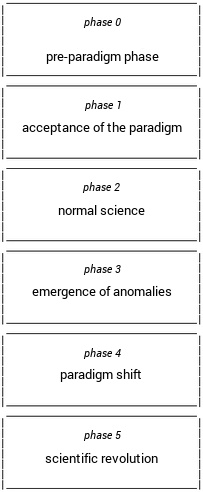Difference between revisions of "Khun paradigms"
Tags: Reverted Visual edit: Switched |
|||
| Line 108: | Line 108: | ||
<Center> | <Center> | ||
Contribute your expertise to Science by starting a discussion | Contribute your expertise to Science by starting a discussion | ||
<div class="colour-button">[[Talk:Khun paradigms|Change today for tomorrow's success]] | <div class="colour-button">[[Talk:Khun paradigms||Change today for tomorrow's success]] | ||
</div></center> | </div></center> | ||
{{Bib}} | {{Bib}} | ||
Revision as of 10:46, 25 March 2024
Ab ovo[1]
Before diving into the analysis of Masticationpedia, it is necessary to introduce some preliminary considerations. These concern, in particular, two fundamental dimensions - social, scientific, and clinical - that are characteristic of both the current era and the one immediately preceding it.
The phases of paradigm change according to Thomas Kuhn
In the course of the last century, there has been an exponential increase in technological and methodological "Innovations",[2] especially in the field of dentistry. These advancements have significantly influenced decision-making strategies, opinions, schools of thought, and axioms, aiming explicitly at improving the quality of life, as highlighted in the "Science of Exposure in the 21st Century".[3] However, this exponential growth implicitly hides conceptual ambiguities - or, in practical terms, "side effects" - which, although sometimes underestimated, have the power to challenge some scientific certainties, making them less rigid and more subject to probability.[4] The sensitive aspects of the current social, scientific, and clinical reality, which may seem contrasting, will be revealed to be complementary by the end of this reading; this is the "Progress of science" according to Kuhn's interpretation and "Epistemology".
In analyzing the progress of science, Thomas Kuhn, in his most famous work, argues that science develops through distinct cycles, reflecting its operational dynamics.[5][6] Kuhn advances the idea that science is structured around paradigms and establishes a clear demarcation between science and pseudoscience, based on the presence of a shared paradigm. For him, the evolution of scientific progress is seen as a continuous curve, yet interrupted by discontinuities represented by paradigm shifts.
Taking on the role of a skilled problem solver, the scientist is engaged in resolving these anomalies. These moments of discontinuity, or scientific revolutions, occur when the existing paradigm can no longer adequately interpret new anomalies, thereby pushing the scientific community towards the exploration and eventual adoption of new paradigms that better align with emerging observations.
Kuhn's phases in Dentistry
Thomas Kuhn identifies in the evolution of a scientific paradigm five distinct phases, a process that holds crucial importance for Masticationpedia. To stay in line with the project's objectives, we will focus on the description of the three most significant phases, as outlined in the book's index.
Thomas Kuhn in his most famous work states that science cyclically passes through some phases indicative of its operation. According to Kuhn, science is paradigmatic, and the demarcation between science and pseudoscience can be traced back to the existence of a paradigm. The evolution of scientific progress is assimilated to a continuous curve which undergoes discontinuity in paradigm changes.
Kuhn's phases in Dentistry
Kuhn, on the other hand, divides the evolution of a paradigm into five phases; this is a fundamental process for Masticationpedia, but to stay tuned with the project we will limit ourselves to describing the three most significant phases shared in the project and indicated in the index of the book:
| |
| |
|
It's almost taken for granted that Kuhn's scientific philosophy gives priority to discipline, since an anomaly within the genetic paradigm will be more easily recognized by a geneticist rather than a neurophysiologist. This concept, however, seems to contradict the epistemological evolution of Science, thereby making a detailed analysis of this apparent discrepancy appropriate.
Contribute your expertise to Science by starting a discussion
- ↑ Latin for 'since the very beginning'
- ↑ Heft MW, Fox CH, Duncan RP, «Assessing the Translation of Research and Innovation into Dental Practice», in JDR Clin Trans Res, 2019».
DOI:10.1177/2380084419879391 Oct 7:2380084419879391 - ↑ «Exposure Science in the 21st Century. A Vision and a Strategy», Committee on Human and Environmental Exposure Science in the 21st Century; Board on Environmental Studies and Toxicology; Division on Earth and Life Studies; National Research Council.».
ISBN: 0-309-26468-5 - ↑ Liu L, Li Y, «The unexpected side effects and safety of therapeutic monoclonal antibodies», in Drugs Today, 2014, Barcellona».
DOI:10.1358/dot.2014.50.1.2076506 Jan;50(1):33-50 - ↑ Thomas Samuel Kuhn (Cincinnati, 18 luglio 1922 – Cambridge, 17 giugno 1996) was an American philosopher of science.
See Treccani, Kuhn, Thomas Samuel. Or Wikipedia, Thomas Kuhn. - ↑ Kuhn Thomas S, «The Structure of Scientific Revolutions», Univ. of Chicago Press, 2012, Chicago».
ISBN: 9780226458113
